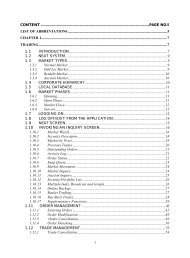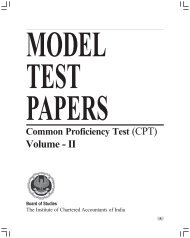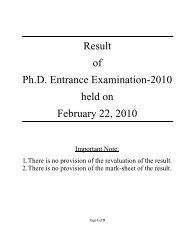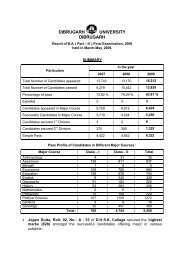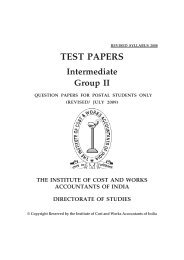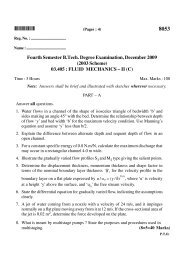Document file:///D|/Export1/www.netlibrary.com/nlreader/nlreader.dll ...
Document file:///D|/Export1/www.netlibrary.com/nlreader/nlreader.dll ...
Document file:///D|/Export1/www.netlibrary.com/nlreader/nlreader.dll ...
You also want an ePaper? Increase the reach of your titles
YUMPU automatically turns print PDFs into web optimized ePapers that Google loves.
<strong>Document</strong><br />
Page 26<br />
paper that made persuasive points verbally, without tying up all the loose ends. After 1960, however, an<br />
attempt to publish a paper like Rosenstein-Rodan's would have immediately gotten a grilling: ''Why not<br />
build a smaller factory (for which the market is adequate)? Oh, you're assuming economies of scale?<br />
But that means imperfect <strong>com</strong>petition, and nobody knows how to model that, so this paper doesn't make<br />
any sense.'' It seems safe to say that such a paper would have been unpublishable any time after 1970, if<br />
not earlier.<br />
Some development theorists responded by getting as close to a formal model as they could. This is to<br />
some extent true of Rosenstein-Rodan, and certainly the case for Fleming (1954), which gets painfully<br />
close to being a full model. But others at least professed to see a less formal, less disciplined approach<br />
as a virtue. It is in this light that one needs to see Hirschman and Myrdal. These authors are often cited<br />
today (by me among others) as forerunners of the recent emphasis in several fields on strategic<br />
<strong>com</strong>plementarity. In fact, however, their books marked the end, not the beginning, of high development<br />
theory. Myrdal's central thesis was the idea of "circular causation." But the idea of circular causation is<br />
essentially already there in Allyn Young (1928), not to mention Rosenstein-Rodan; and Nurkse in 1952<br />
referred repeatedly to the circular nature of the problem of getting growth going in poor countries. So<br />
Myrdal was in effect providing a capsulization of an already extensive and familiar set of ideas rather<br />
than a new departure. Similarly, Hirschman's idea of linkages was more distinctive for the effectiveness<br />
of the term and the policy advice that he derived loosely from it than for its intellectual novelty; in<br />
effect Rosenstein-Rodan was already<br />
<strong>file</strong>:///<strong>D|</strong>/Export2/<strong>www</strong>.<strong>netlibrary</strong>.<strong>com</strong>/<strong>nlreader</strong>/<strong>nlreader</strong>.<strong>dll</strong>@bookid=409&<strong>file</strong>name=page_26.html [4/18/2007 10:30:04 AM]





